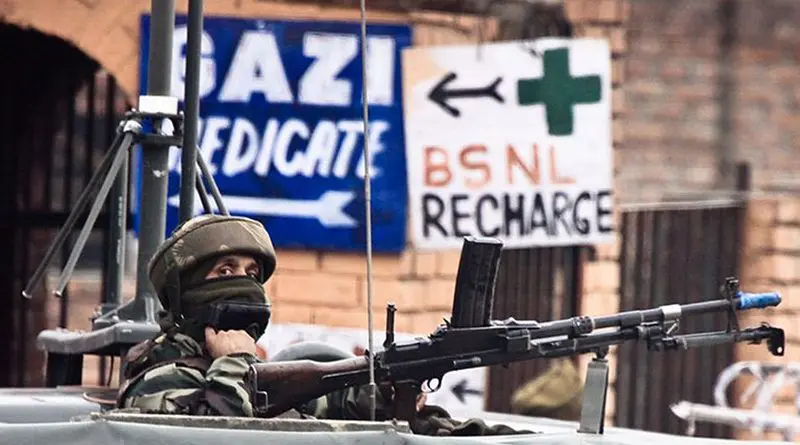Indian Move Practically Shuts Door On US Mediation In Kashmir – OpEd
By Mayank Chhaya*
In one fell swoop, the abrogation of Article 370 of the Indian Constitution shuts the door on any prospective move by the Trump administration to get involved in the Kashmir dispute between India and Pakistan. With the declaration of Jammu, Kashmir and Ladakh as union territories, Prime Minister Narendra Modi has unambiguously turned the region’s challenges into a strictly internal issue.
As New Delhi’s writ now fully runs over Jammu and Kashmir, apart from Ladakh, it also renders United Nations resolutions over the Kashmir dispute redundant for all practical purposes. If the state no longer has a ‘special status’, including functional autonomy, in the Indian government’s view it is just another integral part of India where no external opinion is relevant.
Pakistan Prime Minister Imran Khan’s sanguine boast that after returning from his maiden visit to Washington as his country’s leader he felt as if he had won the cricket World Cup now seems risible in light of the fundamental reorganization of the state. If Khan had any hope of President Donald Trump mediating with India over Kashmir in order to free up Pakistan’s military resources from its eastern border in order to focus on Afghanistan, it has come a cropper. Trump’s plan to withdraw from Afghanistan after nearly 19 years is incumbent upon Islamabad sharing a significant amount of security burden, which in turn is affected by how much it has to remain committed along the India border.
In declaring Jammu, Kashmir and Ladakh union territories, the Modi government may also have indirectly turned the Line of Control into the de fact international border with Pakistan. It is not clear whether the Trump administration had any direct knowledge of what was afoot in Delhi in the past few weeks. The US president’s claim that he was asked by Modi during the recent G20 summit in Osaka, Japan, to mediate sounds curious in retrospect as if he might have had a whiff of this historic shift in India’s Kashmir policy.
For Pakistan, notwithstanding its familiar assertions that it will “exercise all possible options to counter the illegal steps” are unlikely to move any needles internationally, especially in Washington and the United Nations.
The folding of J & K into the Indian union more formally gives the Modi government the ability to present its status as a fait accompli to the rest of the world. The overarching argument being that when it was needed Article 370 was introduced and when its utility is gone it has been abolished.
Even before the abrogation, successive US government had no locus standi in the matter other than occasionally advising India and Pakistan to resolve the dispute peacefully. After it, it has even less ability to tell New Delhi how to deal with a territory it officially declares part of the union.
The decision puts Pakistan in a particularly difficult situation since it effectively says India has chosen to do what it thinks is right and that’s that. Prime Minister Khan had no way of anticipating this dramatic move so early into Modi’s second term even though it was part of the ruling BJP’s manifesto as well as one of the core features of its ideology for decades. In near term and even in long term, there is not much that Pakistan can do as an effective counter to the move other than perhaps intensifying insurgency in the Kashmir Valley.
However, that has become almost impossible because of the Financial Action Task Force (FATF) that makes financing of terror/jihadi groups operating in Kashmir impossible. It is no longer possible for Islamabad to revive a systematic proxy war by financing these jihadi groups as both the International Monetary Fund (IMF) and the FATF work in concert to curb terrorist funding. The IMF has given Pakistan a $6 billion, three-year and has a considerable influence over how runs its affairs.
All things considered, including the legitimate outrage among the Indian opposition parties over the way in which the abrogation was brought in, the decision is unlikely to face any decisive hurdles. On balance, the world’s largest democracy ending special autonomy to a state sandwiched between three nuclear-armed neighbors is a big deal that may not find any international disapproval.
*About the author: The writer is a Chicago-based journalist, author and filmmaker. He can be contacted at [email protected]
Source: This article was published by South Asia Monitor


Hindu India should stop misbehaving and victimizing Kashmiris, and should vacate kashmir.
Kashmir is the symbol of Hinduism real cruel and biased and dishonest face.
A temporary success for Modi. India is too diverse a country to be governed by force. Nationalists of any stripe whether White as in the U.S or Hindu as in India will fail in the long run. Use of force in Kashmir will give rise to even more militancy. It becomes a fertile ground for extremist organizations as ISIS or equivalent as people of Kashmir react against such extreme measures.
Nice of you to insult Kashmiris as usual, effectively saying their default reaction will be to resort to being terrorists… (read the PS before asking any questions)
sad to know they are held in such low esteem.
PS: No one wants Kashmir to stay the way it is. As the Indian Army chief said, it will be best outcome if the gunless days of pre-1987/1989 can be recreated.. sadly that will require pakistan to accept LoC as border and stop terrorism before India can restore a 370 like devolution for Kashmir again.
A good article.
As regards the two commentators above, even a blind Freddie will know who they really are. Hiding behind the names will not fool anyone. ISI fake news mill is on overdrive as usual! ISI will end up as the victim of its own deceptions.